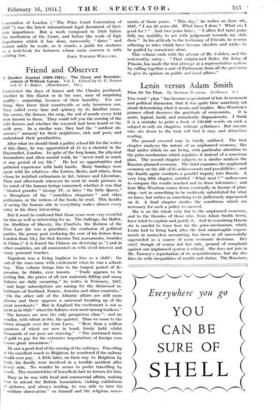Friend and Observer
A Quaker Journal (1804-1861) : The Diary and Reminis- cences of William Lucas. Vol. I. Edited by G. E. Bryant and G. P. Baker. (Hutchinson. 18s.)
CERTAINLY the days of horses and the Classics produced, whether in this diarist or in his sons, men of surprising quality : surprising, because of their humility. For one thing, they knew their countryside as only horsemen can. They called every lane and spinney by its familiar name. The owner, the farmer, the crop, the soil of nearly every field were known to them. They could tell you the coming of the wild flowers and whether the wryneek had been heard or the swift seen. In a similar way, they had the "outdoor ob- server's" memory' for their neighbours, rich and poor, and understood their peculiarities.
After what we should think a paltry school life for the writer of this diary, he was apprenticed at 15 to a chemist in the Haymarket, London. In spite of the long hours, the physical discomforts and often menial work, he "never read so much at any period of my life." He lost no opportunities and gathered experience with both hands. Many Sundays were spent with his relatives—the Listers, Becks, and others, from whom he imbibed enthusiasm in Art, Science and Literature. Then and afterwards wherever he went he made pictures in his mind of the human beings concerned, whether it was that " bloated grandee" George IV, or later "the little Queen," or Brougham of the "matchless eloquence" and other politicians, or the writers of the books he read. This faculty of seeing the human side in everything makes almost every entry in his diary interesting.
But it must be confessed that those years were very eventful for him as well as interesting for us. The Suffrage, the Ballot, the Abolition of Slavery, the Chartists, the Reform of the Poor Law (he was a guardian), the confusion of political parties, the penny post (reducing the cost of his letters from London from 7d.), the first Income Tax assessments, troubles in China (" it is feared the Chinese are deceiving us ") and in other countries, are all commented on with vivid interest and many personal touches.
Napoleon was a living bugbear to him as a child: the end of the wars came with excitement when he was a schOol- boy. This volume brings him to the longest period of de- pression, he thinks, ever known. "Trade appears to be getting flat, the prices of all raw materials falling and many failures are daily occurring," he writes in February, 1837, 'and large subscriptions are raising for the distressed in- habitants of Scotland, France, America and other countries."
On the other side of the Atlantic affairs are still more gloomy and there appears a universal breaking up of the great merchants." But in England the excitement is not so great as in 1825" when the failures were more among bankers." " The farmers are now the only prosperous. class "—and no wonder, with wheat at 84s. the quarter. Thus we come to the bitter struggle over the Corn Laws. "More than a million quarters of wheat arc now in bond, firmly held, whilst thousands of our poor are starving." "The continued drain of gold to pay for the extensive importations of foreign Corn causes great uneasiness."
lie saw a good deal of the coming of the railways. Travelling in the excellent coach to Brighton, he wondered if the railway would ever pay. A little later, on their way to Brighton by train, his family were involved in a terrible. accident after heavy rain. No wonder he seems to prefer travelling by coach. The eccentricities of horseflesh had no terrors for him.
Busy as he was with local and commercial affairs, making lime to attend the British Association, visiting exhibitions of pictures, and always reading, he was able to. turn his "outdoor observation." on himself and the religious move- ments of those years, "This day," he writes on June 4th, 1837, "I am 33 years old. What have I done ? What am I good for.?" And two years later: "1 often feel most pain. fully my inability to act with judgement towards my chil- dren." In his attitude to the testimony of Friends, he resents adhering to rules which have become obsolete and wishes to be guided by conscience alone.
This volume ends with the advent of Mr. Cobden, and the noteworthy entry : "That enlightened Ruler, the King of Prussia, has made the first attempt at a representative systein by calling together a sort of Parliament from all the provinces to give its opinion on public and local affairs."








































 Previous page
Previous page